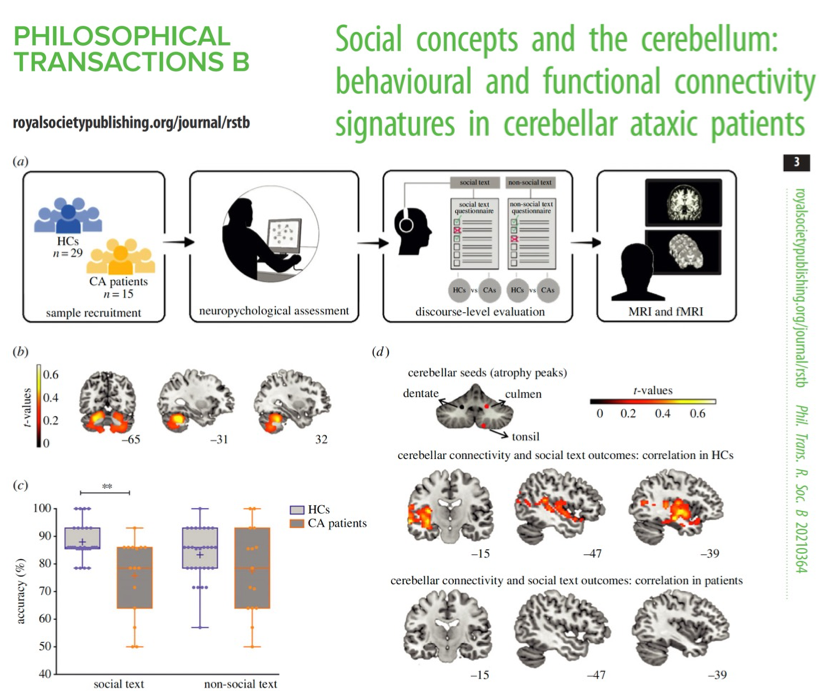Social concepts and the cerebellum: behavioural and functional connectivity signatures in cerebellar ataxic patients
Lopes da Cunha, P., Fittipaldi, S., González Campo, C., Kauffman, M., Rodríguez-Quiroga, S., Yacovino, D., Ibáñez, A., Birba, A. & García, A. M. (2022). Social concepts and the cerebellum: Behavioral and functional connectivity signatures in cerebellar ataxic patients. Philosophical Transactions of the Royal Society B 378, 20210364.
En este trabajo examinamos el rol del cerebelo y sus conexiones corticales en el procesamiento de conceptos sociales. Mostramos que la comprensión de dichos conceptos se ve afectada selectivamente en personas con atrofia cerebelosa focal y se asocia con la conectividad entre el cerebelo y regiones temporales e insulares implicadas en dominios semánticos y sociocognitivos. Estos resultados sugieren que los sustratos críticos de los conceptos sociales se extienden más allá de los sistemas córtico-límbicos típicamente descritos en la literatura.
Para acceder al artículo, hacé click aquí.
Social concepts and the cerebellum: behavioural and functional connectivity signatures in cerebellar ataxic patients
Lopes da Cunha, P., Fittipaldi, S., González Campo, C., Kauffman, M., Rodríguez-Quiroga, S., Yacovino, D., Ibáñez, A., Birba, A. & García, A. M. (2022). Social concepts and the cerebellum: Behavioral and functional connectivity signatures in cerebellar ataxic patients. Philosophical Transactions of the Royal Society B 378, 20210364.
Neurocognitive research on social concepts underscores their reliance on fronto-temporo-limbic regions mediating broad socio-cognitive skills. Yet, the field has neglected another structure increasingly implicated in social cognition: the cerebellum. The present exploratory study examines this link combining a novel naturalistic text paradigm, a relevant atrophy model and functional magnetic resonance imaging. Fifteen cerebellar ataxia (CA) patients with focal cerebellar atrophy and 29 matched controls listened to a social text (highlighting interpersonal events) as well as a non-social text (focused on a single person’s actions), and answered comprehension questionnaires. We compared behavioural outcomes between groups and examined their association with cerebellar connectivity. CA patients showed deficits in social text comprehension and normal scores in the non-social text. Also, social text outcomes in controls selectively correlated with connectivity between the cerebellum and key regions subserving multi-modal semantics and social cognition, including the superior and medial temporal gyri, the temporal pole and the insula. Conversely, brain-behaviour associations involving the cerebellum were abolished in the patients. Thus, cerebellar structures and connections seem involved in processing social concepts evoked by naturalistic discourse. Such findings invite new theoretical and translational developments integrating social neuroscience with embodied semantics.
To access the full paper, please click here.



